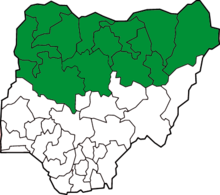History of Boko Haram in Nigeria
The satanic group- Boko Haram, are not muslims but misleads and has noting to do with Islam.Wilāyat Gharb Ifrīqīyyah (Arabic: الولاية الإسلامية غرب أفريقيا, West Africa Province, ISWAP), and was formerly called Jamā'at Ahl as-Sunnah lid-Da'wah wa'l-Jihād' (Arabic: جماعة أهل السنة للدعوة والجهاد, "Group of the People of Sunnah for Preaching and Jihad"), is an extremist group based in northeastern Nigeria, also active in Chad, Niger and northern Cameroon. The group is led by Abubakar Shekau. Estimates of the group's membership varies between 7,000 and 10,000 fighters. The group initially had links to al-Qaeda, but in 2014, it expressed support for the Islamic State of Iraq and the Levant before pledging formal allegiance to it in March 2015.After its founding in 2002, Boko Haram's increasing radicalization led to a violent uprising in July 2009 in which its leader was summarily executed. Its unexpected resurgence, following a mass prison break in September 2010, was accompanied by increasingly sophisticated attacks, initially against soft targets, and progressing in 2011 to include suicide bombings of police buildings and the United Nations office in Abuja. The government's establishment of a state of emergency at the beginning of 2012, extended in the following year to cover the entire northeast of Nigeria, led to an increase in both security force abuses and militant attacks.
Boko Haram has killed more than 17,000 people since 2009, including over 10,000 in 2014, in attacks occurring mainly in northeast Nigeria. 650,000 people had fled the conflict zone by August 2014, an increase of 200,000 since May; by the end of the year 1.5 million had fled.] Corruption in the security services and human rights abuses committed by them have hampered efforts to counter the unrest. The group have carried out mass abductions including the kidnapping of 276 schoolgirls from Chibok in April 2014.
In mid-2014, the militants gained control of swaths of territory in and around their home state of Borno, estimated at 50,000 square kilometres (20,000 sq mi) in January 2015, but did not capture the state capital, Maiduguri, where the group was originally based. A military coalition including Chad and Niger have since displaced the group from most of its occupied territories, although it still controls southern parts of Borno State.
The group's official name is Wilayat Gharb Afriqiya, to designate it as a branch or "province" of the Islamic State of Iraq and the Levant (ISIL). Prior to Abubakar Shekau's pledge of allegiance to ISIL's self-declared Caliph Abu Bakr al-Baghdadi, the group's official name was Jamā'atu Ahli is-Sunnah lid-Da'wati wal-Jihād جماعة أهل السنة للدعوة والجهاد, meaning "People Committed to the Prophet's Teachings for Propagation and Jihad".
The name "Boko Haram" is usually translated as "Western education is forbidden". Haram is from the Arabic حَرَام ḥarām, "forbidden"; and the Hausa word boko [the first vowel is long, the second pronounced in a low tone], meaning "fake", which is used to refer to secular Western education.Boko Haram has also been translated as "Western influence is a sin and "Westernization is sacrilege". Until the death of its founder Mohammed Yusuf, the group was also reportedly known as Yusifiyya. Northern Nigerians have commonly dismissed Western education as ilimin boko ("fake education") and secular schools as makaranta boko.
Ideology
Nigerian states with sharia law shown in green
According to Borno Sufi Imam Sheik Fatahi, Yusuf was trained by Kano Salafi Izala Sheik Ja'afar Mahmud Adamu, who called him the "leader of young people"; the two split some time in 2002–4. They both preached in Maiduguri's Indimi Mosque, which was attended by the deputy governor of Borno. Many of the group were reportedly inspired by Mohammed Marwa, known as Maitatsine ("He who curses others"), a self-proclaimed prophet (annabi, a Hausa word usually used only to describe the founder of Islam) born in Northern Cameroon who condemned the reading of books other than the Quran. In a 2009 BBC interview, Yusuf, described by analysts as being well-educated, reaffirmed his opposition to Western education. He rejected the theory of evolution, said that rain is not "an evaporation caused by the sun", and that the Earth is not a sphere.
History
Background
Kano, biggest city in northern Nigeria
Except for a brief period of civilian rule between 1979 and 1983, Nigeria was governed by a series of military dictatorships from 1966 until the advent of democracy in 1999. Ethnic militancy is thought to have been one of the causes of the 1967–70 civil war; religious violence reached a new height in 1980 in Kano, the largest city in the north of the country, where the Muslim fundamentalist sect Yan Tatsine ("followers of Maitatsine") instigated riots that resulted in four or five thousand deaths. In the ensuing military crackdown, Maitatsine was killed, fuelling a backlash of increased violence that spread across other northern cities over the next twenty years. Social inequality, poverty and the increasingly radical nature of Islam, locally and internationally, contributed both to the Maitatsine and Boko Haram uprisings.
In the decades since the end of British occupation, politicians and academics from the mainly Islamic North have expressed their fundamental opposition to Western education. Political ethno-religious interest groups, whose membership includes influential political, military and religious leaders, have thrived in Nigeria, though they were largely suppressed under military rule. Their paramilitary wings, formed since the country's return to civilian rule, have been implicated in much of the sectarian violence in the years following.









.jpeg)
.jpeg)

0 Comments:
Post a Comment